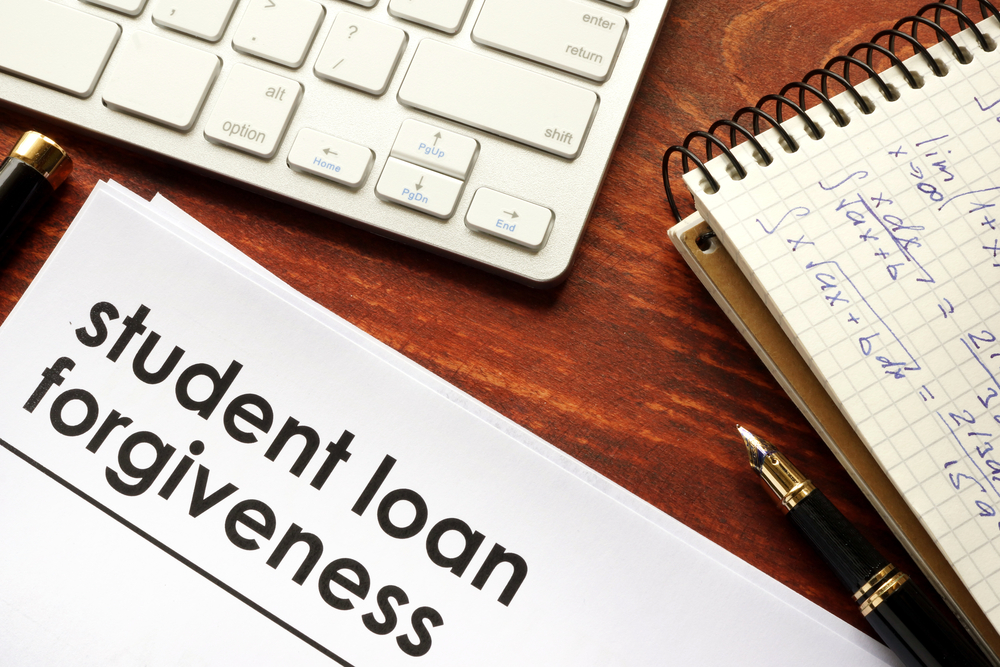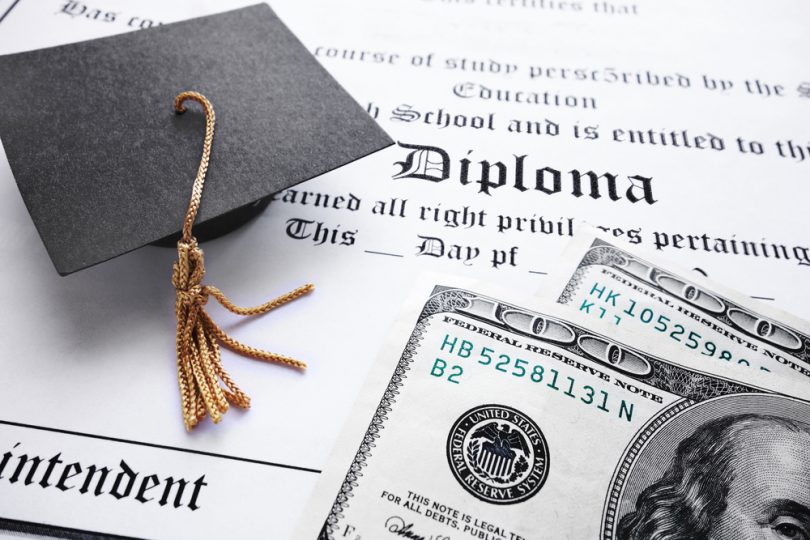Student loans are a cause of major stress for many people.
While student loans are a great investment for your future, you might find yourself in debt that can be unmanageable.
Luckily, there are many options that save you from carrying the anxiety of having to pay off the student loan.
There are programs that can get your student loans forgiven as long as you qualify for it.
Many federal student loans can be forgiven through doing volunteer work, perform military services, work in the medical industry in certain areas, and other criteria that can make you qualified.
Student Loan Forgiveness Options
There are a lot of student loan forgiveness programs that will work for each category, career, and financial situation, but the main programs are through the federal Department of Education like PSLF.
There are private and federal student loans to help fund the education.
The most common choice is federal student loans, as they offer borrower protections and several options for forgiveness.
Although private student loans do not have the same relief options as federal, applying for it is a great option for many reasons.
The Difference Between Federal Loans and Private Loans
The bottom line when it comes to loans is that you must pay it the amount you borrowed, regardless if it is federal or private.
Before signing up for a student loan, you have to understand the legal requirements.
Federal loans originate from the Department of Education, while private loans are made through banks and private lenders.
Federal Student Loans
There are three types of federal student loans, which are Direct Subsidized Loans, Direct Unsubsidized Loans, and direct plus loans that can also be known as Grad PLUS Loans and Parent PLUS Loans.
Federal loans provide flexible options for students and it doesn’t require a credit check unless they are applying for the Federal PLUS Loans for parents and graduate students.
They also offer repayment plans that are based on the income of the borrower after graduation.
Another flexible option that comes with federal loans is being able to change the repayment plan after you have taken out the loan.
Private loan payment plans are usually pretty limited.
Private Student Loans
Private loans are an important option to consider as they provide additional funding sources after federal loans have been maxed out for eligibility.
Some borrowers who have taken out loans with private lenders wonder if private student loan forgiveness is a viable option. Unfortunately, this route is only open for federal loans. Instead, the best alternative is through settlement.
Private loans can have variable or fixed interest rates; meaning that a fixed rate will never change and your monthly payments are the same until your debt is paid off, while a variable rate will depend on the loan’s index and it can be higher or lower each month.
Private student loans can offer several options for a repayment plan. Some options can be a fixed interest rate that is a lot more predictable due to your monthly payments remaining the same.
Other options can be repayment plans with interest only every month while you are in school.
Some students may not have the option to take out federal student loans or have a parent that can’t get the Parent PLUS loan to help cover the additional fees.
Private loans give international students an option to apply for a loan they are qualified for, since the federal loan has difficult requirements they can’t usually meet for permanent citizenship.
If you happen to miss the deadline for filling out the FAFSA, that doesn’t mean that you need to drop out or skip the semester. Private loans give students a great opportunity to finish their education if they are not able to take out federal loans for some reason.
It can become very overwhelming to find the right option that will work for you and this guide can help you make that decision.
Best Private Student Loans Companies
Each private loan company has its own pros and cons, it will be up to you to see what can fit your needs best.
Some of the things you have to consider are whether you want a repayment plan that is fixed APR or variable APR, if they offer discounts, and have multiple repayment options.
Here are the best private student loan companies to consider:
Sallie Mae
Sallie Mae is one of the most well-known private lenders for student loans. They offer several loan options, but don’t expect a very flexible agreement between the borrower and the lender.
Sallie Mae requires a credit check in order to offer you rates for the loan, and they provide undergrads a Smart Option Student Loan to help pay for college. There is also no origination fee or prepayment penalty.
The interest rates for fixed APR starts at 4.25% and the variable APR starts at 1.25% for student loans.
Sallie Mae is a common source of funds among students who apply for private loans, as they are one of the largest private lenders.
Citizens Bank
Citizens bank is good for international students with a cosigner who is a US citizen or a permanent resident, and for others as well.
Undergraduates can get an amount that is up to $150,000 and parents can get $350,000 for their child’s education.
Ascent
Ascent is a great option for borrowers that don’t have a cosigner, as they allow students who are starting junior year to apply without requiring them to have a person who will be responsible for paying off the debt if the student is not able to.
They offer students three options to choose from, which are cosigned loans, non-cosigned loans, and future income-share options.
Ascent also offers cash back options that are 1% when you graduate and 2% discount for autopay if you choose the future income-based loan.
There is also no origination fee for Ascent private student loans.
Earnest
Earnest is a great choice for payment flexibility.
Earnest allows the students to skip one payment a year and give a 9-month grace period after you graduate, which is not very common among private lenders.
Options for Private Student Loan Forgiveness

While private student loans can be a great investment for your future and to continue your education, it can be difficult to pay off. Private loans have less repayment options and it can’t be forgiven (other than settlement), but there are ways to save you from the stress of paying off the loan.
Here are some ways that will help you pay off your private student loan:
Private Student Loan Repayment Assistance Programs
Federal loans are known to have student loan forgiveness programs that the private loan does not have, but you can still get help to pay it off.
Many states offer student loan repayment assistance programs for teachers, nurses, lawyers, dentists, doctors, and pharmacists.
You can also look into the option of finding a company that provides students with a loan matching benefit to help employees pay it off.
Other options are programs in certain states that aid new residents to pay off their loans as well such as The Kansas Rural Opportunity Zones program.
Speak with Your Lender
Each company has different rules for private student loans and it is recommended to talk to your lender (or hire a professional to communicate for you) when you have problems with paying off the loan.
Lenders have options to help borrowers who are struggling with finances such as giving them an option to postpone the payments for a certain amount of time that the lender chooses, and even settling defaulted loans – although this can be complex and require serious negotiation skills to get the best deal.
It is important to consider what options the lender will give you when you are struggling financially to protect yourself from hurting your credit due to falling behind on your repayment plan with the company.
If you do fall behind, it’s important to find a way to recover that will also help improve your credit.
Once a private loan is in default, only settlement or a payoff will help bring credit back to good standing. A payment plan, by itself, will not.
If you’re not sure about speaking to your lender or having difficulty, consider hiring a finance professional who has experience working with private student loan lenders.
Refinance Your Private Student Loans
You can refinance your private student loans by consolidating the loan into a new one that has a lower interest rate.
Lowering your monthly payment will help you through the repayment process.
Some programs offer lenders a choice to temporarily stop the payments if they happen to become unemployed.
Looking into refinancing student loans options will give you choices that are different from loan forgiveness, but will work perfectly to ease the stress on your shoulders if you are a good fit.
Increase Your Income
The easiest way to pay off your private student loan is to simply explore your options of increasing your income.
Consider asking your employer for the raise you deserve or find a part-time job to do on the weekends.
Increasing your income will decrease the amount of months you have to pay to completely be free of student loan debt.
Check for Any New Laws on Private Student Loan Forgiveness
Student loan debt is an issue that many people struggle with and each year the laws change.
Many states are constantly looking into options to reduce student loans or create programs that will help borrowers to pay it off.
Continue checking the news for any updates that can be beneficial for your monthly payments.







